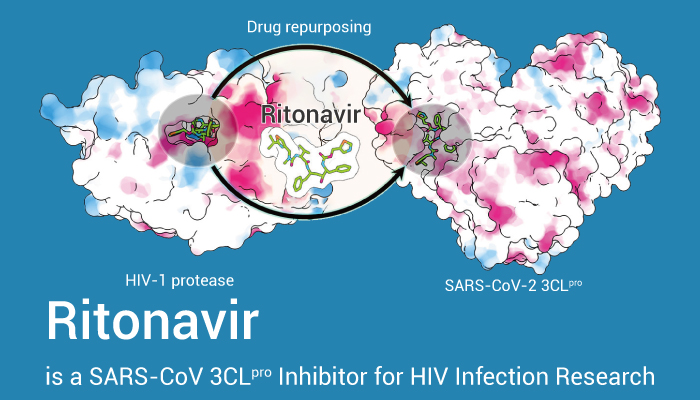HIV-1 protease (PR) is a retrovirus aspartyl protease (retropepsin), an enzyme involved in the hydrolysis of retroviral peptide bonds that is critical to the life cycle of HIV, the retrovirus that causes AIDS. HIV includes two major subtypes, HIV type 1 (HIV-1) and HIV type 2 (HIV-2). HIV-1 viruses are further divided into M, N, O, and P groups. Moreover, HIV-1 group M viruses are the most prevalent and known for their increased virulence or drug resistance. At the same time, there is another virus that has caused an epidemic health scare, SARS-CoV. 3CLpro is an enzyme necessary for coronavirus replication. Here we introduce an orally effective HIV-1 protease/SARS-CoV 3CLpro inhibitor, Ritonavir (ABT 538).

Ritonavir is an orally active inhibitor of both HIV-1 and SARS-CoV, as well as an inhibitor of cytochrome P-450.
In the area of infection, Ritonavir is also a SARS-CoV 3CLpro inhibitor with an IC50 of 1.61 μM. And also, it hands up with other antiretroviral therapies (ART) to effectively inhibit HIV-1 infection. Ritonavir has high affinity for p-glycoprotein and inhibits p-glycoprotein-mediated anti-Saquinavir effects with an IC50 of 0.2 μM]. Ritonavir potently inhibits human hepatic microsomal metabolism of ABT-378 with a Ki of 13 nM. Ritonavir significantly reduced viral load while increasing CD4+ cell counts in clinical trials. It has been approved by the FDA, and used widely and effectively around the world.
Interestingly, Ritonavir is also a potent inhibitor of cytochrome P-450 (CYP) 3A, inhibiting CYP3A with an IC50=0.14 μM. It also inhibits CYP3A (IC50=1.1 and 4.6 μM) in combination with ABT-378 (ratios 3:1 and 29:1). It potently inhibits CYP3A-mediated biotransformation. Ritonavir is also an inhibitor of CYP2D6 (IC50=2.5 mM) and CYP2C9/10 (IC50=8.0 mM). It reduces caspase-1 expression levels and caspase-3 activity, reducing annexin V staining. Thus, in uninfected human PBMC cultures, Ritonavir increased cell viability and significantly reduced PBMC susceptibility to apoptosis. Ritonavir inhibits the induction of tumor necrosis factor (TNF) production by PBMCs and monocytes in a time- and dose-dependent manner at non-toxic concentrations.
In summary, Ritonavir is a potent HIV protease, SARS-CoV 3CLpro, and CYP3A inhibitor.
Reference:
[1] Croxtall JD, et al. Drugs. 2010 Oct 1;70(14):1885-915.
[2] Kumar GN, Drug Metab Dispos. 1999 Aug;27(8):902-8.
[3] Kumar GN, et al. J Pharmacol Exp Ther. 1996 Apr;277(1):423-31.